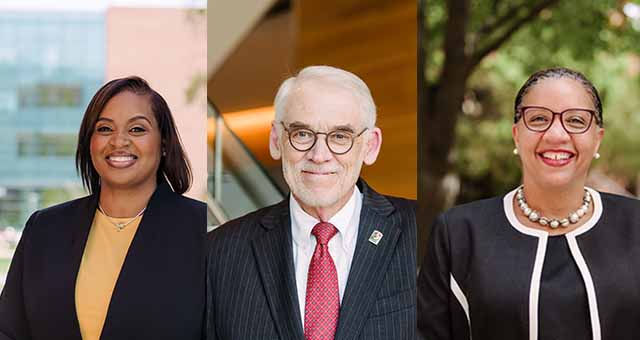Renique Kersh might not have been able to spend her first few days physically on campus, but the new vice president for student affairs wanted her students and colleagues to know they were on her mind. So, in late August, as she juggled dropping her sons off at school and navigating a move from Boston, Kersh sent along photos as a travel diary on social media so that the UMBC community could take this journey with her.
“To say it’s been a blur is an understatement, but as I shared with my team, I am all in,” said Kersh, previously the vice president for student affairs at Simmons University in Boston, Massachusetts.
It was a return home for Kersh, who began her career at UMBC two decades ago as a community director in Residential Life. Kersh cherished that time and she reflected on the experience saying, “I truly believe that this is a very special place.”
Of Kersh’s appointment as vice president, UMBC President Valerie Sheares Ashby says, “She will bring to UMBC deep and broad expertise in student affairs and student development as well as exceptional leadership capacities and a richness of experience in higher education that spans student engagement and academic affairs.”
To connect even more closely with the UMBC community, Kersh hosts “Coffee Chats” every Wednesday where individuals can sign up for a 30-minute one-on-one conversation with the vice president.
“I’m here to do serious work. I’m here to do important work, work that can never be done in a silo but requires the energy, expertise, and insight of everyone in this room,” she said while addressing the crowd at UMBC’s 2023 Fall Opening Meeting.
In mid-August, David P. Dauwalder joined UMBC as the interim provost. Throughout his career, he has served as provost at several institutions, both public and private, including Central Connecticut State University; Woodbury University; University of New Haven; California State University, Stanislaus; and Central Washington University.
“I’ve come here to help this institution continue to move forward and to prepare for the long-term leader that you’re going to hire,” says Dauwalder.
Although he’s here temporarily, the wealth of experience Dauwalder brings to the position will benefit the community in regards to his anticipated work with operational assessments, enrollment planning, and more.
“All of this I look at as being in the context of this university becoming a 21st century model of an R1 and student-success-centered university,” says Dauwalder.
In addition to new leadership under Tanyka M. Barber, vice president for institutional equity and chief diversity officer, the recently-created Division of Institutional Equity now includes the renamed Office of Equity and Civil Rights. Barber says, “This new name unequivocally reflects the university’s commitment to ensuring civil rights protections for everyone within our UMBC community.”
Barber plans to focus on inclusive excellence and the use of restorative practices to help the Division for Institutional Equity succeed.
“This work is personal for me. I wanted to work for an institution that was genuinely committed to diversity, equity, and inclusion and belonging,” says Barber.

